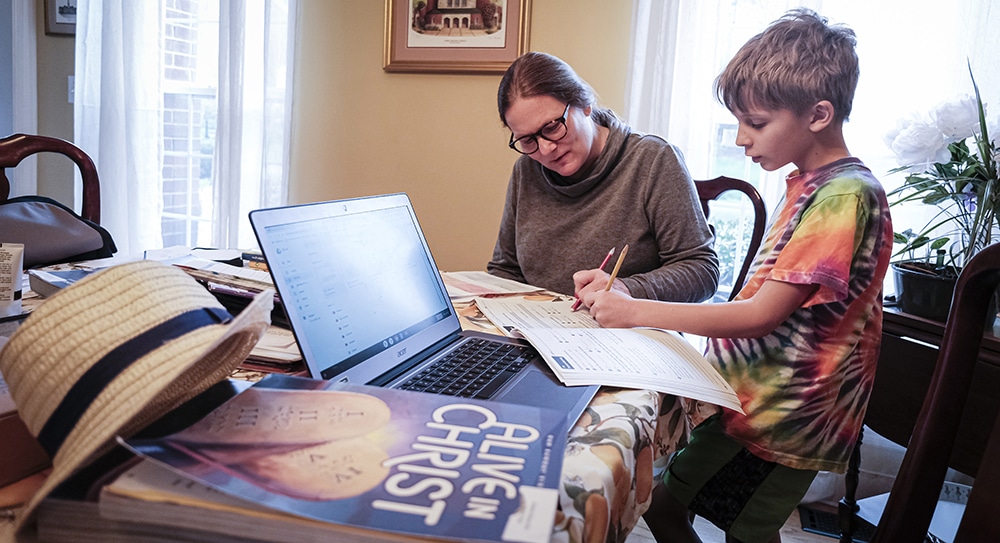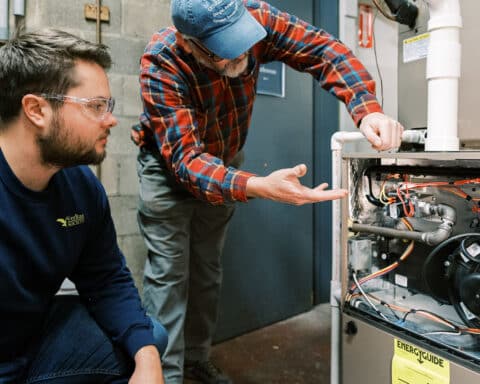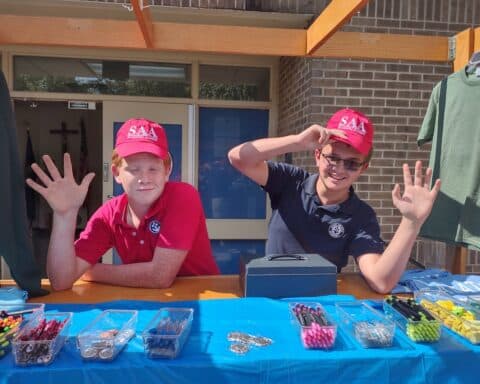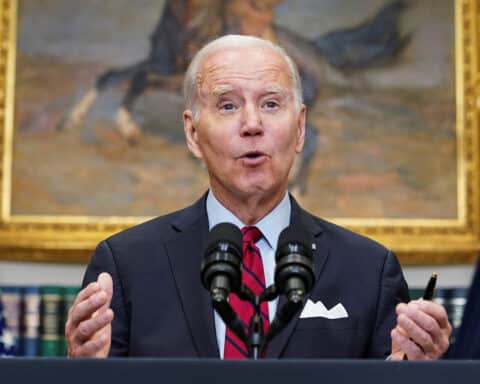Annually, as Catholic school students nationwide enjoy Easter break experiences with their families, thousands of their dedicated educators gather at the annual NCEA convention for professional development and spiritual formation. This year, the National Catholic Educational Association has quickly mobilized to replace the annual in-person event with NCEA Virtual 2020, which is being held April 14-16. The online learning event, designed to engage Catholic educators, elevate professional practice and strengthen collaboration within and across Catholic schools, will feature both live and on-demand learning sessions. Within the first two days of registration, more than 1,600 educators had registered online for the free event.
Learning knows no limits
Kevin Baxter, chief innovation officer for NCEA, will be co-presenting live on the timely topic “Financing Catholic schools in the time of coronavirus.” Baxter and his co-presenter, Susan Abelein, will address specific financial issues related to the crisis, including how schools should budget and plan for the 2020-21 school year.
“The good initial news is that we are hearing from superintendents and principals from across the country that they have heard positive feedback from their parents about how the school has adjusted to remote learning,” Baxter said. “In a number of cases, schools have heard from public school parents who are expressing interest in enrolling because of the positive job the Catholic school is doing.”
Baxter and Abelein will additionally address how Catholic educational institutions must center themselves on mission and faith. “Parents have to see and feel that value, which is obviously more difficult to ensure in a remote environment,” Baxter said. “That value is centered on our faith, first and foremost, and also on building community. So ensuring that there are faith activities online for schools and that there are opportunities for students and parents to build community on a regular basis is a key focus.”
Sister Nancy Usselmann, FSP, director of the Pauline Center for Media Studies, applauds NCEA’s move to a digital format. She hopes that her presentation “Media Saints: Living Mindfully in a Digital World” will be beneficial to teachers and catechists who are seeking to bring media literacy into their learning environments in the context of a “lived Christianity”.
John Reyes, assistant superintendent for Catholic schools in South Carolina and a consultant for NCEA who is assisting with the expedited transition to a digital format, acknowledged the challenge of replicating the spirit of an in-person event online.
“The annual NCEA conference has had a strong following for some time now, and a good deal of that comes from the excitement and fellowship flowing from having thousands of Catholic educators in one place sharing in elevating the mission of Catholic education,” Reyes said. “Harnessing that excitement, fellowship and desire to grow when so many Catholic school educators have been pulled through this radical and rapid shift in how to be present to families and kids while at the same time trying to ‘recharge’ those on the front lines of the mission are all things we as a team are keeping in mind. But these challenges present a collective opportunity to be innovative.”
Local experiences of distance learning
Barb Gilman, a third-grade teacher at St. Margaret Mary School in Omaha, Nebraska, is a frequent attendee and presenter at NCEA conferences. Gilman is an early adopter of classroom technology who frequently tests and shares innovative teaching strategies with her students.
“I’ve heard it said that we teachers have ‘Apollo 13’d’ remote learning for our students in days!” she said. “This was true for me, too. I’ve always dabbled in tech, and I’m comfortable using these tools, but teaching third graders how to use these tools independently does have challenges.”
St. Margaret Mary School had already instructed students on the use of Google Classroom, but Gilman was quick to express appreciation for parents who are learning new technology such as IXL, ReadWords, Quizizz and SeeSaw alongside their children. Gilman is not doing any synchronous teaching due to the challenge of having students on a variety of devices, but she does conduct weekly Zoom calls with her students and is online daily during school hours to provide immediate help for her students.
JD Ferries-Rowe serves as chief information office at Brebeuf Jesuit Preparatory School in Indianapolis. “We prioritized connectivity and continuity in the days before we went virtual,” said Ferries-Rowe, who will serve as a presenter at NCEA Virtual. “Since then, based on feedback from teachers, parents and the students themselves, we have adjusted our schedule to maximize good learning and care for the students. This has included dealing with food insecurity issues, keeping a robust support system in place, including counselors, technology support and campus ministry. We have also created a virtual Spirit Week to keep everyone connected and having as much fun as a community as possible.”
In Charleston, Reyes noted that equity of access to technology remains an issue for families and schools. Along with the numbers of devices needed, his office must also balance internet connectivity issues as well as the frequency of support that parents may be able to provide for their students learning at home.
“We’re blessed to have dedicated and motivated educators that are demonstrating on a regular basis that our schools are more than classrooms,” Reyes said. “Our leaders and teachers particularly note that some of the challenges in serving families lie in fostering positive relationships given the intense stress of this sudden change, finding the sweet spot in terms of meaningful academic work and ensuring that families see the value of what schools are offering as we both close out this year and plan for the next year.”
Lessons Learned
Many of the educators who will be participating in NCEA Virtual 2020 agree that despite the hardships of educating students via remote learning, there are lessons to be garnered from the current situation.
“I heard a great line from Kristin Dixon, who is the superintendent in the Archdiocese of Seattle,” Baxter said. “She said she is choosing not to focus on what might be dying through this crisis but rather on what is trying to be born. I really like that framing, because this is obviously a tragedy, and we pray for all the loss of life and devastation the virus is causing across the country. But are there perhaps things we can learn about relationships, connection, community and our faith that we can utilize to make Catholic schools even stronger on the other side? My initial sense is that there are many lessons to be learned. At NCEA we are trying to embrace the challenges and learn what we can so that Catholic schools emerge even stronger than they were before this started.”
In South Carolina, Reyes underscores Catholic schools’ need to invest increasingly in their connectedness. “Our diocese spans the entire state of South Carolina, so physical distancing has been an issue for us even before the pandemic, and the extent to which we can break down the silos of isolated practice within and across schools directly impacts the quality and effectiveness of our mission,” Reyes said. “I believe we have always had the tools and the capacity to make this happen. But the novelty of all of this is that the urgency for us to truly stand and learn together has done wonders in terms of transforming best intentions into real action.”
“The key to excellent education is the relationship between the student and the teacher. This is the soil in which learning grows. To the extent it has been maintained, students have thrived. This moment has given us a pause to figure out what is really important in education — we should not let that go,” said JD Ferries-Rowe who is assisting his own daughter with her distance learning experience. “There is a lot that goes into school beyond the classroom and traditional learning. I loved watching my 11-year-old sit down with her lunch and a computer to have ‘lunch’ with her classmates. Their giggles and discussions were pure gold. Everything — from the morning Mass to the end-of-school daily examen — has been virtualized as much as possible. But it is difficult to replicate the entire experience — plays and musicals, athletics, short in-the-hall conversations, chats with favorite teachers and students, all-school Masses, pep rallies; this is the living aspect of the thing we call ‘school.'”
For more information on NCEA Virtual 2020, or to register as a free online attendee, click here.
Lisa Hendey writes from California.





